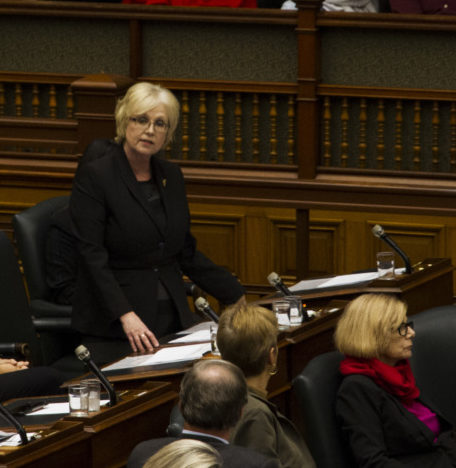Classes at George Brown College to resume on Tuesday, college doesn’t “anticipate” a refund for students
Story updated with comments from Deb Matthews, Peggy Sattler, Warren Thomas, and Aimee Calma at 7 p.m.
Legislation to force Ontario college faculty back into their classrooms passed today, with a vote of 39-18, ending the strike that began on Oct. 16.
The Colleges of Applied Arts and Technology Labour Dispute Resolution Act was introduced by the government on Nov. 16 after talks between the bargaining teams of the faculty and colleges did not produce a deal. The legislation prohibits a continuation of the strike or an employer lockout while the two sides go through binding arbitration.
The back-to-work bill was called “anti-worker” by Ontario New Democrats (NDP) leader Andrea Horwath. But Deb Matthews, the minister of advanced education and skills development, said in a statement that students were affected by the strike for too long.
“We needed to put students first, and get them back to their studies,” Matthews said. “This legislation ensures students can get back to the classroom and refocus on their education.”

Peggy Sattler spoke in opposition to the bill that ended the college faculty strike. Photo: Kit Kolbegger / The Spare
Peggy Sattler, who is the NDP’s advanced education critic, said she is pleased for students who can move forward with the condensed semester, but said the Liberal government did nothing for five weeks to get a negotiated settlement.
“Back-to-work legislation is not going to address any of the big issues that led to the strike in the first place,” she said.
The Ontario Public Employee Union (OPSEU), which represents the faculty, had been critical of the college system’s reliance on contract professors and instructors, and what it called a lack of faculty input on what is taught classrooms.
The College Employer Council (CEC), who bargained on behalf of Ontario’s 24 colleges, had said repeatedly the union’s demands were not the basis of a settlement and would costs between $250 and $400 million per year.
In a statement, the CEC welcomed the passage of the legislation.
“The strike has been incredibly disruptive to students and we needed to end it,” said Sonia Del Missier, chair of colleges’ bargaining team. “The colleges will be working with all faculty to return quickly to the education and training of 500,000 students.”
OPSEU president Warren (Smokey) Thomas said that the CEC was “unaccountable” and caused the strike to be extended by two weeks when they forced a vote on its offer while the two sides were close to a deal.
“I think the employer just sat back and wouldn’t really bargain in earnest,” he said. “They just waited for the legislation.”
Thomas added that it was regrettable that a deal wasn’t reached before or after the strike. And while going to arbitration is “rolling the dice,” he said that faculty has made gains, including raising awareness on precarious work and the start of a college task-force to look at full-time and part-time faculty ratios.
Classes to resume at George Brown on Tuesday
Shortly after the legislation passed, George Brown College announced that classes will resume at the college on Tuesday and that the earliest date that assignments can be due and exams scheduled is Friday.
The college said with the passing of the back-to-work legislation today that the two-business days’ notice that they had previously said would be given to students was not possible as the new law requires colleges to start classes immediately.
Aimee Calma, a director at the College Student Alliance (CSA), said she was thankful for the return to classes, but added that students are concerned that they will be “half-trained” or unable to succeed in the condensed timeline.
“They haven’t been in class for weeks and they were only in for the first four weeks of that semester so for them to try and recall where they were and to start back in, it’s going to be a rocky transition.”
The CSA is advocating that students should have the option to withdraw from the semester and receive a full tuition refund.
George Brown College said on a new post-strike FAQ on their website that they are working with faculty to ensure all curriculum is covered in the fall semester and they “do not anticipate issuing any refunds” for missed classes.
Sattler said that she has heard from many students in “an absolute panic” about facing a condensed semester, and that students should have the option of continuing on or getting a tuition refund.
“We believe that students should have the option of either doing the compressed semester if they believe that’s something they can manage or getting a tuition refund and having a fresh start.”
Last week, the Ministry of Advanced Education and Skills Development said that they were directing the colleges to establish hardship funds for students but details on how those funds would be administered has not be released yet.



